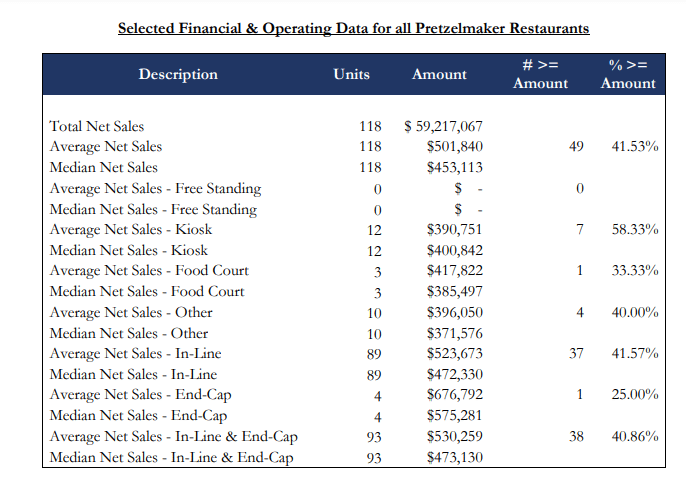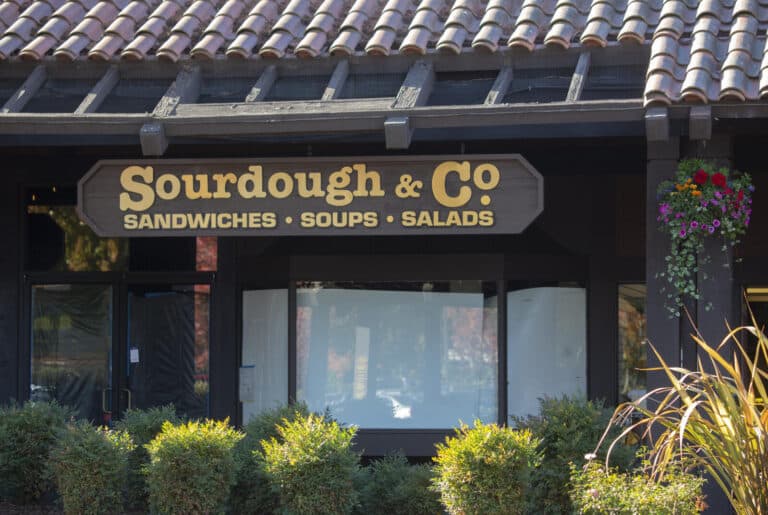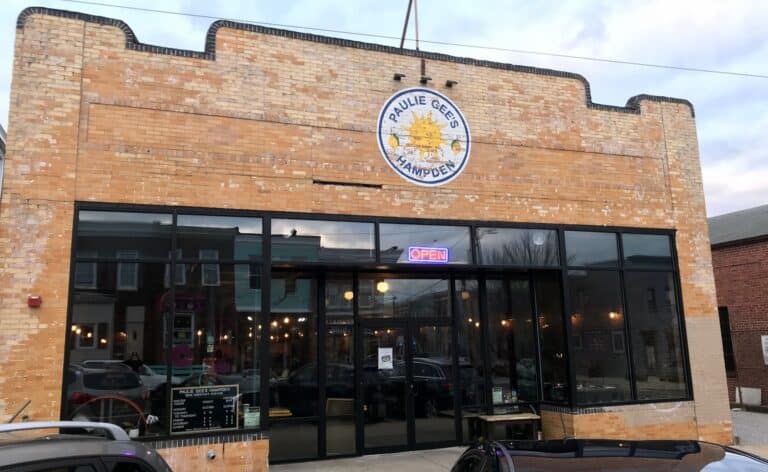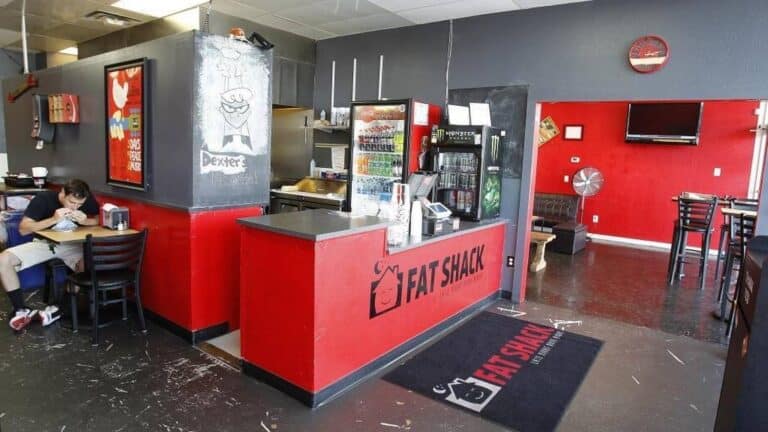Pretzelmaker Franchise FDD, Profits & Costs (2025)

Pretzelmaker was founded in 1991 as a single pretzel stand and has since grown to boast over 280 locations across the United States and internationally.
Headquartered in Atlanta, Georgia, Pretzelmaker began franchising shortly after its inception, allowing entrepreneurs to bring the beloved pretzel experience to various communities.
The franchise is renowned for its innovative Pretzel Bites, which are made from scratch daily using a unique recipe that sets them apart from competitors.
These bite-sized snacks, along with a variety of other pretzel products, have helped Pretzelmaker carve out a distinctive niche in the quick-service food industry. The brand focuses on creating a fun and engaging atmosphere, particularly targeting teens, young adults, and moms.
Initial Investment
How much does it cost to start a Pretzelmaker franchise? It costs on average between $109,000 – $386,000 to start a Pretzelmaker franchised restaurant.
This includes costs for construction, equipment, inventory, and initial operating expenses. The exact amount depends on various factors, including the location, and whether the franchisee chooses to lease or purchase the property.
| Type of Expenditure | Amount |
|---|---|
| Franchise Fee | $25,000 |
| Grand Opening Marketing | $3,000 to $5,000 |
| Travel & Living Expenses While Training | $1,000 to $3,000 |
| Mixes Ingredients | $5,000 to $8,000 |
| Other Opening Inventory | $5,700 to $11,000 |
| Architectural Fees | $8,000 to $12,000 |
| Furniture, Fixtures, Equipment, & Decor | $91,000 to $121,000 |
| Signs | $4,500 to $9,500 |
| Prepaid Rent & Security Deposit | $2,500 to $5,000 |
| Leasehold Improvements | $105,000 to $145,000 |
| Utility Deposits | $2,200 to $3,000 |
| Professional Fees | $1,000 to $6,000 |
| POS Systems & Related Technology | $7,600 to $14,000 |
| Business Licenses & Permits (6 months) | $1,500 to $2,500 |
| Insurance (3 months) | $2,500 to $3,500 |
| Additional Funds (3 months) | $8,000 to $12,000 |
| Total Estimated Initial Investment (Traditional Restaurant) | $273,500 to $385,500 |
| Total Estimated Initial Investment (Non-Traditional Restaurant) | $233,500 to $340,150 |
| Total Estimated Initial Investment (Satellite Restaurant) | $108,750 to $206,144 |
| Total Estimated Initial Investment (Co-Brand Restaurant) | $385,185 to $512,135 |
Average Revenue (AUV)
How much revenue can you make with a Pretzelmaker franchise? A Pretzelmaker franchised restaurant makes on average $453,000 in revenue (AUV) per year.
Here is the extract from the Franchise Disclosure Document:

This compares to $811,000 yearly revenue for similar baked franchises. Below are 10 Pretzelmaker competitors as a comparison:

Download the Franchise Disclosure Document
Frequently Asked Questions
How many Pretzelmaker locations are there?
Pretzelmaker currently operates around 153 franchise-owned locations across the U.S. and international markets. This figure marks a decrease from previous years, with the brand operating approximately 182 stores as of early 2020. The entire system is franchised, and all units are owned by franchisees, with no company-operated locations.
What is the total investment required to open a Pretzelmaker franchise?
The total investment required to open a Pretzelmaker franchise ranges from $109,000 to $386,000.
What are the ongoing fees for a Pretzelmaker franchise?
Pretzelmaker franchisees pay a 6% royalty fee and a 2% marketing fee, both calculated from gross sales. These fees support brand-wide initiatives, such as operational guidance and regional marketing campaigns, designed to boost brand visibility and customer engagement.
What are the financial requirements to become a Pretzelmaker franchisee?
To qualify as a Pretzelmaker franchisee, applicants need a minimum net worth of $250,000 and liquid capital of at least $100,000.
These financial requirements ensure that prospective franchisees have the resources to cover initial expenses, operational costs, and any unexpected needs, supporting a successful franchise launch and ongoing operations.
How much can a Pretzelmaker franchise owner expect to earn?
The average gross sales for a Pretzelmaker franchise are approximately $0.45 million per location. Assuming a 15% operating profit margin, $0.45 million yearly revenue can result in $67,500 EBITDA annually.
Who owns Pretzelmaker?
Pretzelmaker is owned by FAT Brands, a global franchising company known for managing numerous quick-service and casual dining brands.
FAT Brands acquired Pretzelmaker in 2021 as part of its acquisition of Global Franchise Group, which included other brands like Great American Cookies, Marble Slab Creamery, and Hot Dog on a Stick.
Disclaimer
Disclaimer: This content has been made for informational and educational purposes only. We do not make any representation or warranties with respect to the accuracy, applicability, fitness, or completeness of the information presented in the article. You should not construe any such information or other material as legal, tax, investment, financial, or other professional advice. Nothing contained in this article constitutes a solicitation, recommendation, endorsement, advertisement, or offer to buy or sell any franchises, securities, or other financial instruments in this or in any other jurisdiction in which such solicitation or offer would be unlawful under the franchise and/or securities laws of such jurisdiction.
All content in this article is information of a general nature and does not address the detailed circumstances of any particular individual or entity. Nothing in the article constitutes professional and/or financial and/or legal advice, nor does any information in the article constitute a comprehensive or complete statement of the matters discussed or the law relating thereto. You alone assume the sole responsibility of evaluating the merits and risks associated with the use of any information or other content in this article before making any decisions based on such information or other content.




